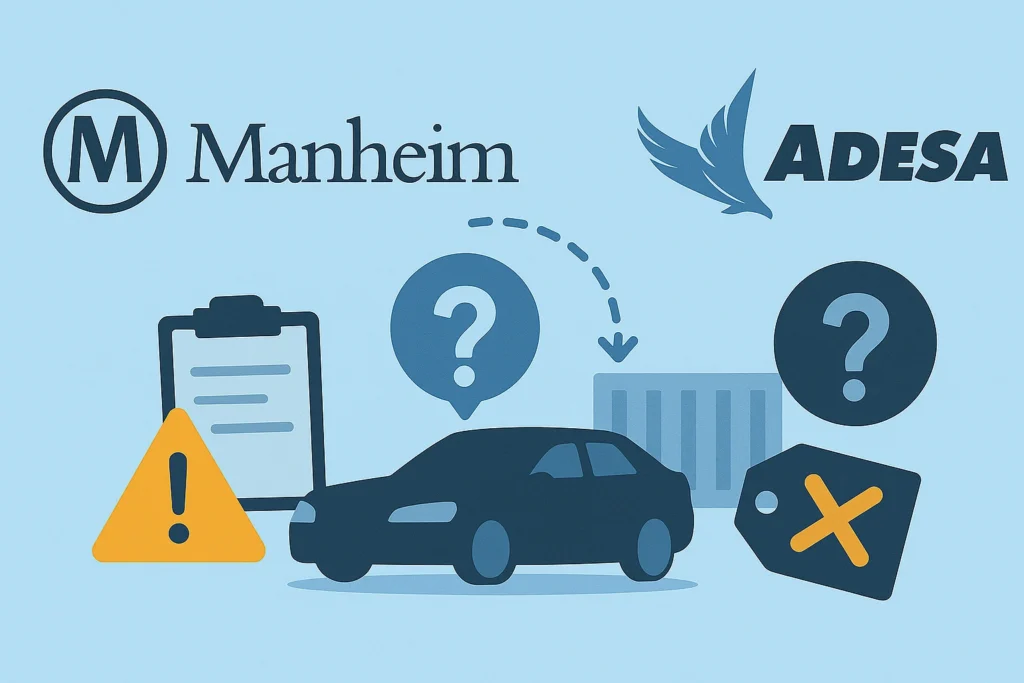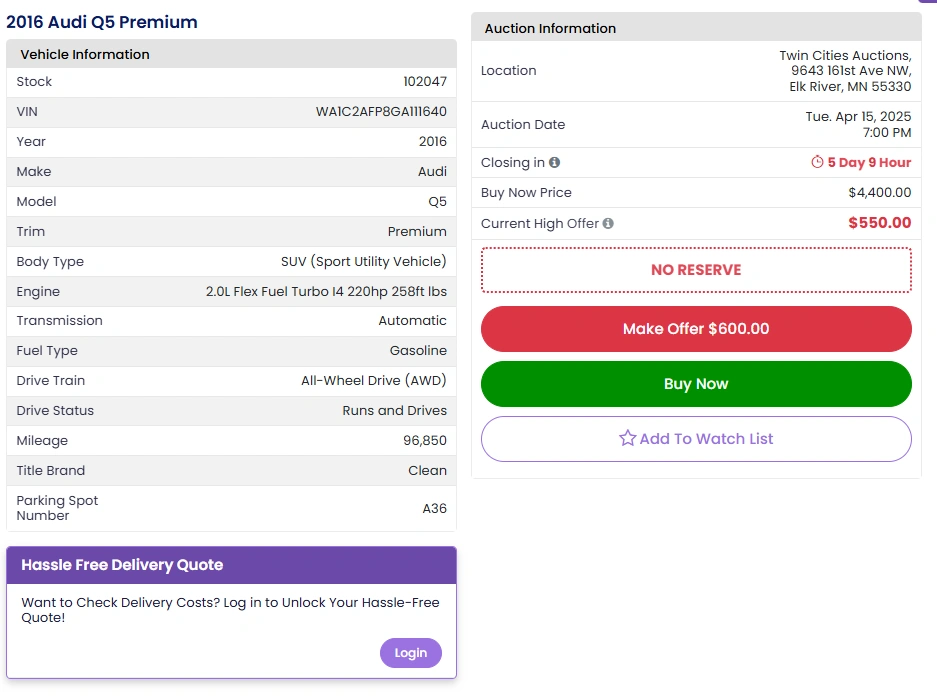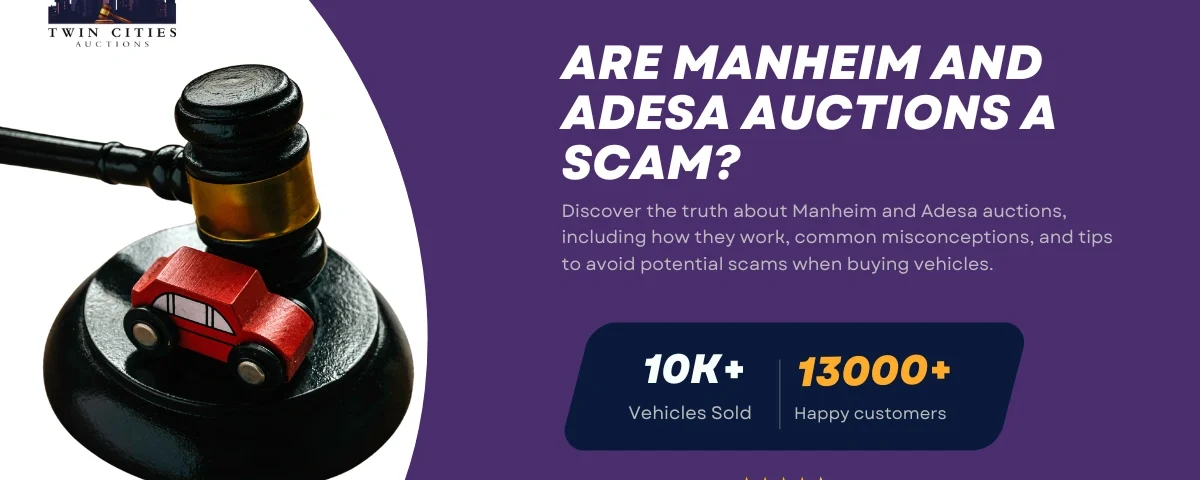More than five and a half million vehicles ran through Manheim lanes in 2024, and ADESA US facilitated well over one million transactions during the same period. With numbers that large, online chatter inevitably drifts toward “too good to be true.”
Search volumes for phrases like Manheim auction scam and Is Adesa legit climbed sharply in 2024, raising a fair question: are these dealer auction giants trustworthy or risky?
This guide separates myth from fact, outlines every real pitfall, and hands you a practical checklist for safe bidding.

Key Takeaways
- Learn how dealer auctions publish titles, condition reports, and fee menus
- Spot myths versus genuine fraud attempts by impostors
- Review red-flag warnings and buyer-protection steps
- Compare real-world fees for a $15,000 hammer price
- Understand why wholesale auctions can still beat retail sourcing
How Dealer Auto Auctions Work
Dealer auctions move wholesale cars quickly under strict policies.
- Access – State law limits live bidding to licensed dealers; public buyers must hire a broker.
- Run lists – Each VIN posts online 24–72 hours before sale with disclosure codes and an NAAA condition grade.
- Sale day – Cars roll past the block in sixty-second bursts; the hammer price plus posted buyer fee becomes your invoice.
- Payment deadline – Same business day via ACH, floor-plan draft, or certified funds.
- Arbitration window – Two hours for undisclosed issues, extended to 7–21 days if you buy a Post-Sale Inspection.
Who Owns Manheim and ADESA
Corporate ownership and scale reveal how far removed these brands are from pop-up scams.
| Category | Manheim | ADESA US |
| Parent company | Cox Automotive (Atlanta) | Carvana (acquired 2022 for $2.2 billion) |
| U.S. auction sites | 76 physical locations | 56 physical locations |
| 2024 volume | ≈ 5.5 million vehicles offered | > 1 million vehicles transacted |
| Digital marketplace | Manheim.com, Simulcast, Go App | ADESA.com Marketplace |
| Buyer-protection program | DealShield PSI (7- and 14-day) | ADESA Assurance (up to 21 days) |
Myths Versus Documented Scams
Myth: Manheim and ADESA hide salvage titles
Fact: NAAA policy forces red-light or disclosure-code announcements for salvage, flood, or frame brands.
Myth: Anyone can walk into an auction and bid
Fact: You need a dealer license or a broker acting under one.
Documented scam: Look-alike websites or social-media pages demand wire transfers to fake accounts
Defense: Bid only through the official portal and pay with auction-approved methods.
Documented scam: Bogus condition reports emailed from spoof domains
Defense: Pull the CR directly inside Manheim.com or ADESA.com before paying.
Red Flags and Buyer Pitfalls
Descriptive text: These warning signs should halt or slow your bid until questions are resolved.
| Red flag | What it means | Smart response |
| Title-absent light | Seller has 30 days to produce paper | Bid only if you can wait or escrow funds |
| Frame-damage code with green light | Structural repair noted but no red light | Order a Post-Sale Inspection or skip the unit |
| Buyer number mismatch | Broker using an unauthorized account | Confirm gate release matches your dealership |
| Payment past cutoff | Late fees and possible sale void | Wire or floor-plan within stated window |
Buyer Protections and Best Practices
- Pull a VIN history from NMVTIS or Carfax before bidding
- Zoom every damage photo in the condition report
- Purchase a PSI on cars above $5 000 to extend arbitration
- Verify disclosure codes—red, yellow, or green—before raising a paddle
- Use insured transport and document the car on pickup and drop-off
- Save digital copies of gate pass, title, and PSI report
Real-World Fee Comparison for a $15,000 Hammer Price*
A short note: Fees vary slightly by region but follow published schedules.
| Fee item | Manheim | ADESA |
| Buyer fee | $650–$700 | $680–$720 |
| Online convenience | $59 | $69 |
| Optional PSI | $125 | $115 |
| Gate/out-processing | $40–$50 | $40–$45 |
| Total above hammer | ≈ $899 | ≈ $929 |
Always check the latest regional schedule before bidding.
Why Auctions Are a Smart Choice for Car Purchases
Auctions can be an excellent source for late-model vehicles with clear chains of title and affordable pricing. Twin Cities Auctions, based in Minnesota, is one such reputable auction house that offers a wide range of vehicles at competitive prices.
Key Benefits of Buying from Auctions:
- Wide Selection: Auctions like Twin Cities Auctions offer a variety of vehicles, from low-budget cars to high-end models.

- Competitive Pricing: Auctions often offer vehicles at prices below retail value, enabling dealers to maximize their profit margins.

- Transparency: Auctions provide full vehicle history reports, so you know exactly what you’re buying.

- Convenient Bidding: Many auctions offer online bidding for your convenience, making it easier to source vehicles without being physically present.
Twin Cities Auctions: A Smart Vehicle Sourcing Choice
For those in the automotive industry, Twin Cities Auctions offers an excellent platform for sourcing quality vehicles at competitive prices.
Whether you are just starting or expanding your business, this auction house provides transparency, competitive pricing, and a broad selection.
| Feature | Description |
| Inventory Variety | Wide range of cars, trucks, and SUVs available |
| Competitive Pricing | Below-market pricing allows for higher profit margins |
| Vehicle History Reports | Detailed history reports for every vehicle |
| Online Bidding | Convenient online bidding options for dealers |
| Financing Options | Financing available to help with inventory purchases |
Conclusion
Manheim and ADESA are established, regulated marketplaces—not scams. The rare horror stories involve impostors misusing the brand or buyers who ignore posted policies.
Follow condition reports, verify fees, pay on time, and use the built-in inspection and arbitration tools. Do that, and dealer auctions can become a reliable pipeline for inventory or a smart avenue to secure a personal ride below retail.
Your Next Car is Just a Click Away at Twin Cities Auctions!
Twin Cities Auctions brings the excitement of car auctions directly to your screen. No dealer license? No problem! Our online platform is open to the public, offering a wide range of vehicles to suit all tastes and budgets.
Whether you are an automotive enthusiast or a first-time buyer, you’ll find an impressive variety of vehicles that cater to all tastes and budgets. From reliable family sedans and eco-friendly hybrids to high-performance cars and premium SUVs, our listings are curated to ensure quality and diversity.
Enjoy a hassle-free bidding process and secure your perfect match from our extensive lineup. Don’t miss out—your next car is just a click away at Twin Cities Auctions!Looking for more options? Explore our comprehensive list of all available car auctions across the United States. Your next deal might be just a click away!
FAQ
Can the public attend Manheim or ADESA auctions
No—state law and auction rules limit bidding to licensed dealers or their registered brokers.
What is arbitration
Arbitration is the formal process that lets a buyer return or renegotiate a vehicle if undisclosed problems surface within the allowed window.
Are online bids riskier than in-lane bids
Risk is similar when you rely on the digital condition report and purchase a Post-Sale Inspection.
How fast must I pay after winning
Same-day payment is mandatory; auctions may void the sale and charge late fees if funds arrive late.
How are transport damage claims handled
Document the car at pickup and delivery; file any claim with the carrier’s cargo insurer within 24 hours.


